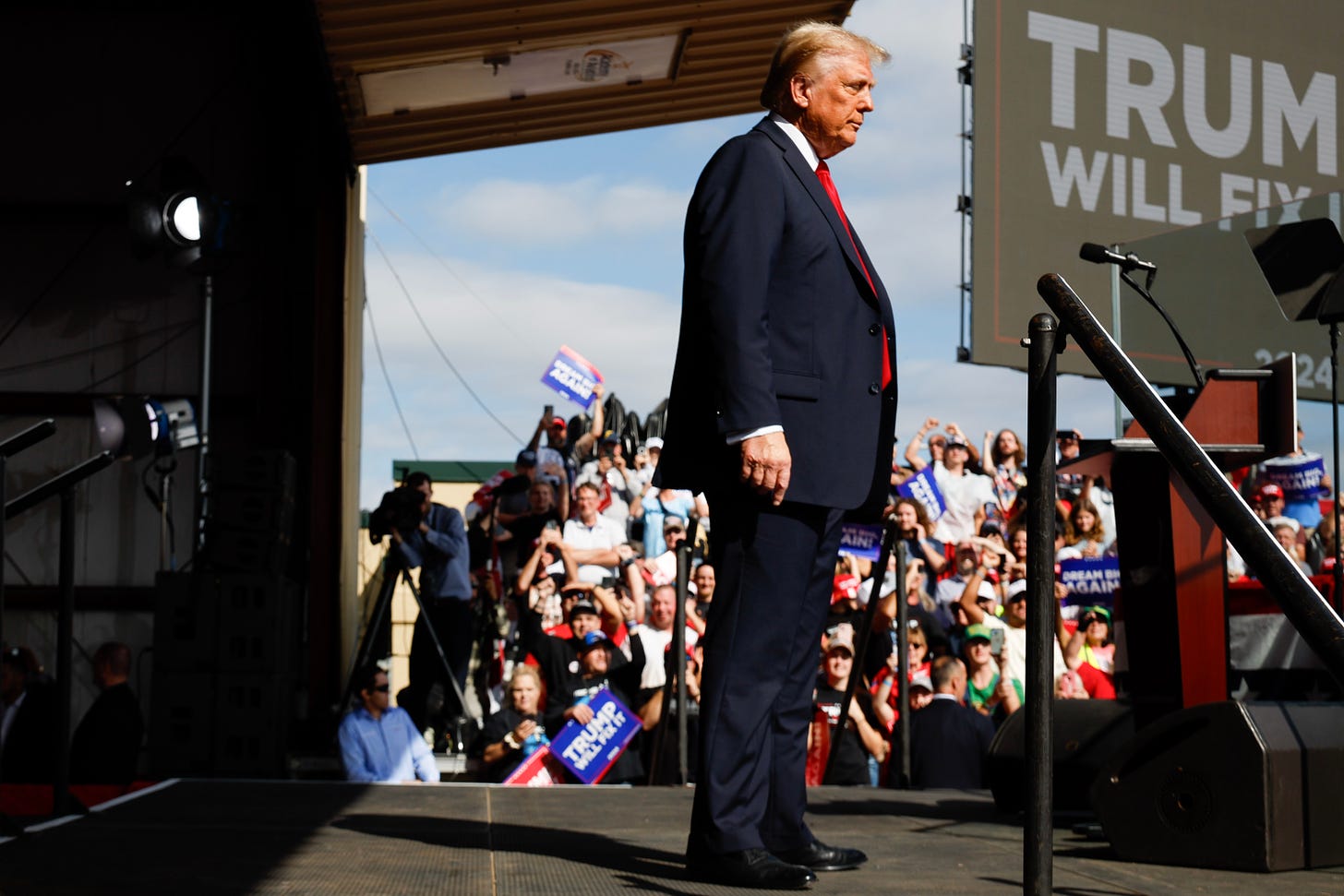
Trump Wants to “Fix” Our Booming Economy. Don’t Let Him Near It.
He made a mess of it last time—and his new plans, from taxes to tariffs to mass deportations, are even worse.

BARACK OBAMA HAS BEEN TRYING HIS BEST to inject some inconvenient truths into the information stream in the final weeks of the 2024 campaign—most importantly, that he knows a thing or two about how to fix an economy, and Donald Trump doesn’t.
“Some people say, ‘Well you know what, I remember the economy being pretty good when Donald Trump first came into office,’” Obama told a crowd in Pittsburgh the other day. “Yes—it was pretty good. Because it was my economy! Because I’d spent the previous eight years cleaning up the mess that the Republicans had left. And we had had seventy-five straight months of job growth, and I handed it over to Donald Trump. And all he did was give a tax cut to folks who didn’t need it and drive up the deficit in the process. So do not give him credit for that. That’s not what makes an economy strong.”
Fact check: true. Obama came into office in January 2009, amid a global financial collapse and recession. He did notch seventy-five straight months of job growth. Trump did sign a tax law that mostly helped corporations and the rich get richer. (He even bragged about it in those terms at Mar-a-Lago, telling wealthy friends that “You all just got a lot richer.”) That law added $1.9 trillion to the federal debt. And if Trump wins, the cycle will repeat, this time with President Joe Biden overseeing the handoff.
A Wall Street Journal analysis last week was perfectly clear on that point. “The Next President Inherits a Remarkable Economy,” the headline read. “The high quality of recent economic growth should put a wind at the back of the White House’s next occupant.” CNN concluded it was time to give America credit for a “rare feat”—its “remarkable and historic achievement” of a soft economic landing from the pandemic. And over on NPR: “The healthy labor market and stronger spending bode well for the economy.”
These positive reviews appeared last week amid solid reports on inflation, wages, growth, and consumer confidence, and a jobs report that showed unemployment holding steady at a low 4.1 percent (despite a weak job creation number attributed to strikes, storms, and data-collection problems, with an upward revision expected after these jolts subside). In short, the U.S. economy is going strong, and leaving the rest of the world in the dust.
Anna Kelly, a Republican party spokeswoman, recently gave ABC News an absurd statement about the economy: “Kamala is a continuation of Biden’s failed economic policies, and they’ve left our economy in shambles. Kamala Harris broke America’s economy . . . but President Trump will fix it through his America first policies.”
Please, no. He should not get the chance to try.
Harris in her short campaign has proposed, among other things, tax credits to help families with children, Medicare coverage for home health care, steps to make housing more affordable, and a ban on corporate price gouging on food. The Committee for a Responsible Federal Budget (CRFB) says her plan, which includes Medicare savings on drug prices and higher tax rates on businesses and high-income households, would add half as much to the deficit and debt as Trump’s would.
Trump’s economic plans would be disastrous on a grand scale. He wants to slap blanket tariffs on all imports and mass deport some 11 to 12 million undocumented immigrants. That would be a hammer blow to consumers, employers, and the overall economy. Eight to nine million of these immigrants are in the U.S. workforce doing essential jobs and paying nearly $100 billion in local, state, and federal taxes. Plus it would cost taxpayers $20 billion to deport just one million of them. Trump also wants to control the powerful, traditionally independent Federal Reserve, which sets interest rates and regulates the U.S. financial system.
“We find that these steps would result in lower U.S. national income, lower employment, and higher inflation than otherwise. In some cases, economic conditions recover over time, but in others the damage continues through 2040. And despite Trump’s ‘America first’ rhetoric, these policies would harm the U.S. economy more than any other in the world,” concluded analysts with the Peterson Institute for International Economics in a report reflecting the consensus among mainstream economists across the spectrum.
The budget hawks at CRFB say Trump’s plans will “dramatically worsen Social Security’s finances,” bringing on insolvency and reduced benefits in six years rather than the currently anticipated nine. Trump also implies a dim future for the “so bad” bipartisan CHIPS and Science Act, which is already investing billions across the country to jumpstart semiconductor manufacturing and reduce dependence on China. He says the Affordable Care Act “stinks” as congressional Republicans lobby for another push to repeal the 2010 law that has been a boon for hospital finances, jobs in health care and other fields, and the health—financial and physical—of families and workers.
Trump could also weaken the economy by prosecuting his political opponents or otherwise eroding the rule of law—creating instability that dampens investment. As for his friends, he’s already said he’ll name Elon Musk as his “government efficiency” enforcer, and seems fine with the “temporary hardship” Musk warns will be necessary when he looks for at least $2 trillion in spending cuts (about one third of the entire annual budget, including Social Security and the military).
What’s not to not like?
The last time he was in office, Trump’s trade war with China cost an estimated 245,000 U.S. jobs. It cost farmers so much and made them so angry that by late 2020, 92 percent of tariff proceeds had gone to bail them out. Trump failed to kill the ACA but did manage to weaken the health care law, which was a lifeline for millions who lost job-based health insurance in the abrupt economic contraction and temporary unemployment caused by the COVID pandemic.
And about that pandemic: The economic and public health crisis was worse than it needed to be. A global pandemic was a foreseen event, but the Trump administration offered a “sluggish and chaotic” response, researchers concluded in a detailed 2022 study. COVID required strong executive leadership, they wrote, but Trump did not provide it. Although the United States makes up 4 percent of the world’s population, it accounted for more than 20 percent of all COVID cases confirmed during the years Trump was in office. “This outcome was not inevitable,” their study said. “While not responsible for everything that went wrong, President Trump was a decisive factor behind the tragically sub‐optimal US pandemic response.”
In 2018, pre-COVID, I wrote that the president and his party were making every bad choice possible on the economy. “From trade to immigration to debt to income inequality, you’ll find Trump, Republicans or both on the wrong side of the facts and the future,” I said.
In 2024, Trump has left no doubt that he wants past to be prologue—and he’ll do his damnedest to make it so. Vote accordingly.
















